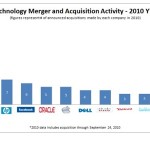
The New York Times editorial questioning Google’s purchase of online flight software company ITA raises questions that could well apply to any new business Google buys unless the Internet Goliath changes its business model.
The Times editorial rightly raises the $64 billion question:
Google cannot abuse its dominance in search to shut out the competition. What would happen to the $80 billion-a-year online travel business if Google’s rivals were relegated to the nether reaches of its search results and it came to dominate the search for online tickets, too?…..
Regulators must consider that if Google extends its dominance to the business of steering online customers to airlines and travel agencies, it would be in a position to charge more for this service. Without strong competitors to keep it in check, it might offer preferential placement to some airlines or agencies for a fee, or not list offers from companies that didn’t pay up. This could lead to higher costs for agencies, airlines and passengers.
In addition to the issue of Google’s size, some competitors worry because ITA’s software powers most of the online travel search engines today. They fear it falling into the hands of a competitor. While Google has said it will license the technology, regulators could extract commitments from the company to ensure that it does so at a fair cost and without degrading the technology.
The question is the right one. A big flag that raised the concern, outlined in an Inside Google report earlier this year on “Universal Search,” is Google’s practice of steering its search results to its own services. As the editorial says:
This concern comes up every time Google adds a new service — comparison shopping, maps, a bookstore. AOL’s Mapquest was clobbered when Google entered that business, dropping from first place to a distant second in less than two years. This was partly because of Google’s putting its own maps on top in response to queries about locations.
Greed has its karma, and Google’s increased antitrust scrutiny is the appropriate answer to a company that wants to corner too many markets. Regulators need to push back.
As the New York Times reminds Googleplex, echoing sentiments expressed by antitrust expert Gary Reeback at our recent privacy conference:
Google’s recent growth by attaching ancillary services to its core search business reminds many technology experts of Microsoft’s old strategy of bundling services like a Web browser, extending its monopoly in operating systems to new markets. That strategy led to one of the biggest antitrust cases of our time, and Microsoft lost.
Google will face a showdown in acquisition after acquisition unless new protections are on the horizon to safeguard against exactly what the Times, the Justice Department and antitrust experts fear.

Wed, Dec 22, 2010 at 3:09 am